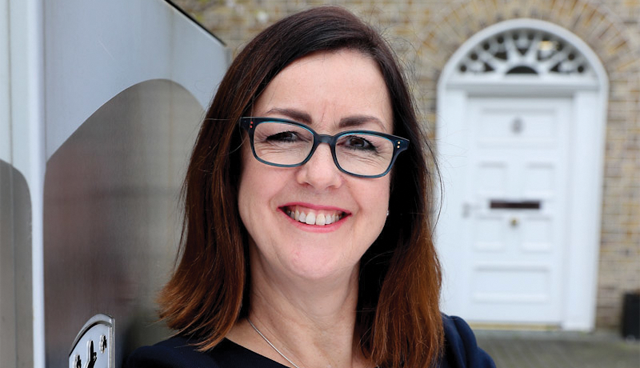The importance of research in addressing the challenges in our health service

While the role of research is readily understood in the context of medical practice, it also holds a crucial position in understanding the medical workforce. Effective workforce research offers insight into the strengths and weaknesses of medical services and informs future planning, supporting practitioners and safeguarding standards of patient care, writes Jantze Cotter, Director of Professional Competence, Research and Ethics at the Medical Council.
This year with the unprecedented arrival of Covid-19 and its resulting implications on health care systems around the world, the importance of effective workforce planning is more evident than ever before. Through its annual registration process and practitioner engagement surveys, the Medical Council, as the regulator of medical practitioners in Ireland, holds a unique set of data offering insight into the medical workforce. Through engaging with the data, the Council in conjunction with health service stakeholders have sought to address challenges and fortify strengths as highlighted by the data, to maintain the high quality of medical care in Ireland.
Everyday across the health service, vast amounts of data are generated relating to patient care and illnesses but also reflecting the health system itself; how it is working and how those who work in it are operating. The effective harnessing of this data, especially during the current pressurised period, should be utilised to inform and improve future healthcare planning for staff and patients alike. Taking the time to compile and examine data can be a rich source of information on improving workforce planning and patient care outcomes.
Over the last number of years, the Medical Council has been using data collected through the annual registration process and Your Training Counts surveys to improve the provision of safe quality patient care. This data enables the Council to both directly and indirectly influence the training and practise of the registered medical profession. The Council’s reporting of medical workforce data has progressed from a purely statistical report to the annual publication of the Workforce Intelligence Report (WFIR). The WFIR links the analysis of qualitative and quantitative data with current health sector issues and policy and is used by stakeholders to inform medical education and training, recruitment and retention strategies, and Irish health care policy. From the Medical Council’s perspective, this data informs the provision of standards, resources, training, education and ongoing professional development and is essential in delivering a safe, quality health care service.
The WFIR is based on analysis of data gathered by the Medical Council through its annual retention of registration process, carried out in June 2019 and 2020. It also draws on existing registration data to provide a cross-sectional overview of new entrants during 2019. Overall trends and themes that emerge from analysis of registration data remain generally robust and stable. The analysis includes quantitative and qualitative data describing registration and divisional status, working arrangements, including self-reported areas of work, hours worked, training status and county of practice. It is a rich source of validated data combined with direct feedback from the medical profession. It highlights ongoing trends of insufficient training places and continued reliance on overseas trained doctors who fill service posts. Recent reports have highlighted the retention of Irish doctors and incidences of burnout as ongoing issues. Joint action of all stakeholders is required to safeguard patient safety and retain our highly trained and experienced medical workforce.

The data has also reflected a continued trend of a growing General Division and attrition resulting from lack of access to training, poor working conditions and retirement. Despite an increase in intern posts, as a direct result of Covid-19, the findings remain consistent. This being, that collaborative efforts are required to support an under-resourced and highly pressured health service to improve retention of Ireland’s highly trained, skilled and experience medical workforce.
Doctors’ wellbeing is paramount and, as evidenced, burnout has a significant impact on patient safety. The findings highlight a number of issues of concern for the Council. Doctors report burnout, bullying, working in excess of the European Working Time Directive, not returning to practice in Ireland due to poor working conditions in comparison to the country in which they are currently practicing, and well-qualified and experienced doctors cannot access training. These challenges impact directly on patient and professional safety.
As reflected in the growth in registrations in the general division, doctors from overseas, filling service posts, have not been able to apply for training programmes up until recently due to the long-awaited amendments to the Medical Practitioners Act. The Regulated Professions Bill enacted in October includes provisions that enable doctors from outside the EU to apply for training programmes. However, the application process is highly competitive, and the number of applicants greatly exceeds the places available. To safeguard the future of the health service training programme places must increase. The National Doctors Training and Planning workforce planning process outlines projections necessary to meet service demands. This must be combined with filling the large number of consultant vacancies to ensure ongoing training and supervision is available.
The Council also gathers information on intern doctors which is published in the Your Training Counts survey (YTC). YTC is the national trainee experience survey, conducted each year by the Medical Council, documenting the experiences of trainee doctors and interns in the Irish healthcare system. The report examines the clinical learning environments, working conditions, experiences of bullying, retention and career plans, and health and wellbeing of doctors on training schemes. The information gathered through the reports informs dialogue and collaboration between individuals and organisations involved in medical education and training in Ireland, with a view to continually improving trainee experiences and outcomes. As mentioned above, a persistent issue facing the health service is doctor retention. Feedback from the YTC is vital in identifying the issues facing doctors early in their careers in order to addresses them and to encourage these doctors to progress their careers in Ireland.
“Recent reports have highlighted the retention of Irish doctors and incidences of burnout as ongoing issues. Joint action of all stakeholders is required to safeguard patient safety and retain our highly trained and experienced medical workforce.”
As discussed, the effective compilation of data and feedback from a workforce can be a highly effective tool in generating positive outcomes. The registration and YTC survey data have been effective in developing a greater understanding of doctors’ practise, including the issues that impact on delivery of safe patient care. It is up to the relevant stakeholders to work together to effect positive change to support patient and profession safety. Although 2020 has been a difficult year for the Irish health service as it was confronted with novel challenges, changes in medical legislation and the continuation of high quality education, training and patient care will ensure that lessons learned from the pandemic will inform and improve future practice and planning.
The Medical Council is the regulatory body for doctors. It has a statutory role in protecting the public by promoting the highest professional standards amongst doctors practising in the Republic of Ireland.
You can find out more information about the Council’s work by visiting www.medicalcouncil.ie.
W: www.medicalcouncil.ie






